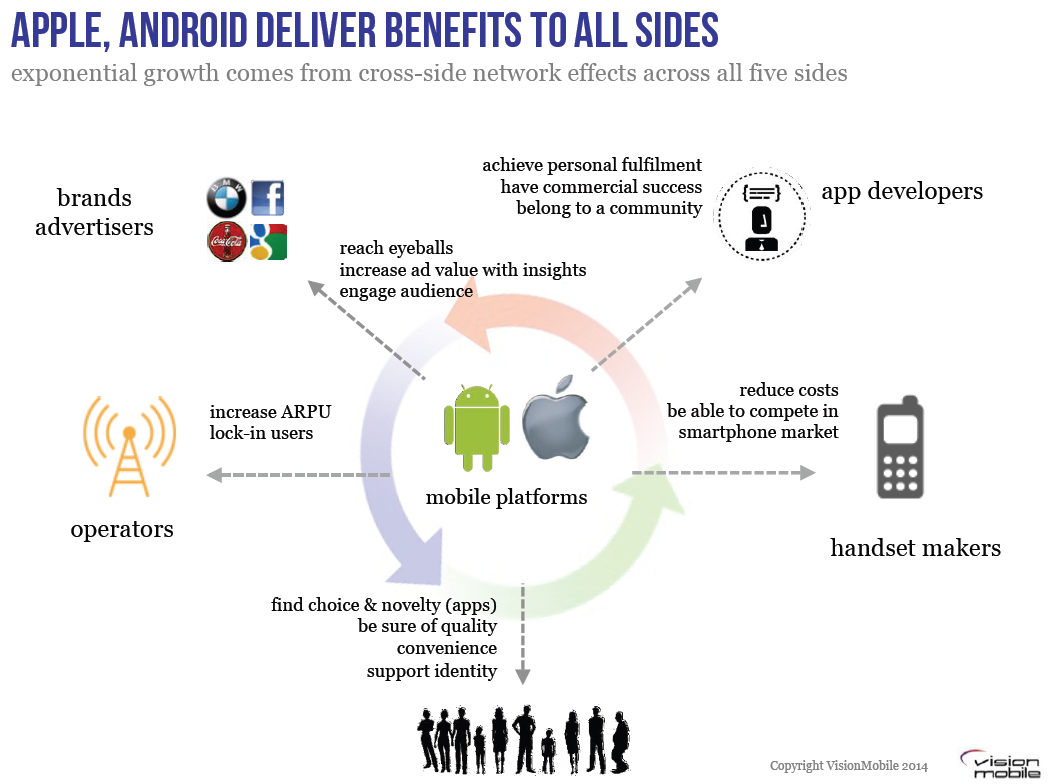The battle for the OS in the PC world has pretty much been at status quo for a few decades, save for some slight growth of Apple’s OS. For mobile it may seem we are moving to a similar duopoly, and a key question to ask is how Google and Apple have managed to get such dominant positions in the mobile space. To point to how they have focused on apps to capture consumer’s attention is an oversimplified view, as it really has to do with looking at offers across the entire eco-system that is mobile, with differing strategies that has delivered different results:
For Apple the formula has been simple, in that they control everything, from the OS, to the store, to the handset and features, to the business models. For Google, the answer is more complex, and it really comes down to the decoupling of the operating system of Android to the apps and services offered on Google Play. This is very well explained in Vision Mobile’s Mobile Megatrends report, which shows how Google has moved key services such as maps, search, mail, authentication/sign-in, in-app billing, sharing APIs, remote wipe, etc, etc).
The question then becomes to what extent should this sort of domination be allowed? To what extent do you put Google through the same scrutiny Microsoft was put through over a decade ago? Interestingly, while Microsoft was forced to open up for any browser on a paid proprietary platform, such scrutiny has not been awarded to Google on a platform that theoretically is open but which is clearly locked in. To what extent is a browser different from an in-app billing engine when soon 90% of revenues come through this mechanism? Yet for a few landmark attempts from competing app stores like Aptoide, and probes by the Australian news media, regulators seemingly are taking little action. You could also make the case that despite being closed (as Microsoft has been), Apple’s iOS is now big enough to be awarded the same scrutiny the Windows platform was put under.
Don’t get me wrong. I am an Android fan to the hilt, and love what Google has done. But at the same time I see what a hindrance it is to dictate APIs and tie things to one store, especially for smaller developers who simply do not have time and resources to maintain a huge number of SKUs of their app in order to fully distribute it globally. The complexity of the business rules and the share number of payment SDKs to maintain is a stretch even for larger players. I love Amazon too, but if Amazon had made a construct where most suppliers of household goods, clothing, electronics etc could only distribute through Amazon.com (unless they were megabrands and had the power to distribute elsewhere) I’d be pretty upset with Amazon.com as well.
Android developers have enough fragmentation to deal with, as Ben Evans points out in an excellent post. Fragmentation in hardware and operating systems is hard enough, but couple it with fragmentation in business models, created by artificial and constraining rules about what you can and cannot use to be visible in an online store, seems worthy of some scrutiny. Perhaps time for Super Mario (Monti) to return to save an industry currently dominated by games.
Disclaimer: The views expressed on this post are mine and do not reflect the views of any clients or companies I am currently working for or have worked for.


Recent Comments